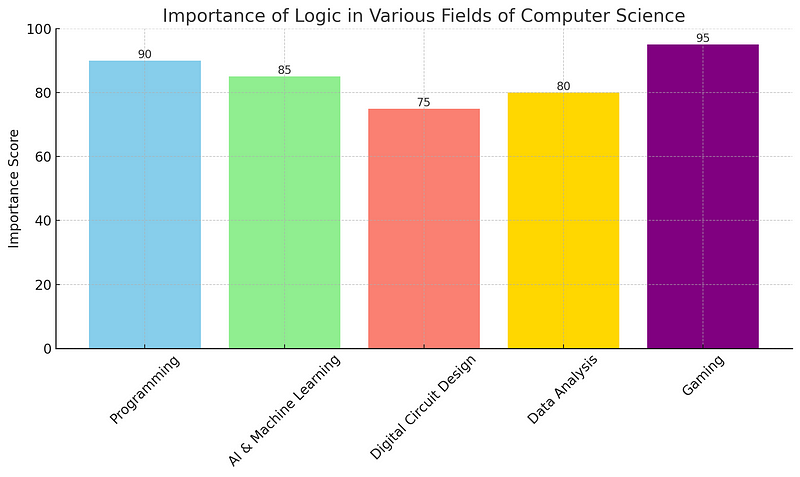The Language of Logic: Understanding Computers and Their Algorithms
Written on
Chapter 1: The Essence of Logic in Computing
Imagine a reality where computers interpret our commands as effortlessly as we communicate with one another. In the realm of computer science, logic serves as that vital translator. It’s not merely a collection of guidelines; rather, it’s a language that animates computers, enabling them to tackle intricate challenges and make informed choices. For those immersed in the digital era, comprehending the significance of logic in computer science is akin to discovering the secret formulas that power everything from smartphones to algorithms that recommend our next favorite song or series.
What is Logic in Computer Science?
Logic can be likened to the cognitive process of reasoning, but applied to computers. In computer science, it’s the essential ingredient that formulates clear instructions for machines to execute. These directives are rooted in true or false propositions, governed by a framework known as Boolean logic. Named after the brilliant mathematician George Boole, this concept forms the cornerstone of programming and digital circuit design, functioning as the genetic material of electronic devices.
Boolean Logic — The Binary Core
At the core of any computer lies a binary language, a fascinating realm of 1s and 0s. Boolean logic acts as the key that translates human directives into this binary dialect. By utilizing operators like AND, OR, and NOT, it crafts intricate expressions that computers can decipher. For example, when you conduct an online search using “AND” or “NOT,” you are essentially instructing the search engine through Boolean logic.
The Role of Logic in Programming
Programming can be viewed as a narrative woven with logic. It involves crafting a storyline with a sequential flow of commands. Logical statements intertwine with conditions and loops, which are fundamental to programming. Consider an ‘if-else’ statement; it resembles a decision point in a narrative: if one condition holds true, follow one path; otherwise, choose another. This logical framework empowers developers to create software capable of decision-making and problem-solving.

Importance of Logic Across Computer Science Domains
Logic Gates — The Foundations of Digital Systems
In the world of hardware, logic manifests through logic gates. These fundamental components function like the atoms of any digital architecture. Each gate executes a basic logical operation, such as AND, OR, or NOT, on input signals to yield a result. By interlinking these gates, we can forge circuits capable of intricate computations, forming the backbone of devices from simple electronics to sophisticated computers.
From Logic to Algorithms
Algorithms serve as the hidden formulas of computer science, comprising a series of directives aimed at solving problems or executing tasks. Crafting an algorithm is an artistic endeavor influenced by logic. It involves dissecting a problem into manageable steps and organizing these logically so that a computer can follow them. This methodology underpins everything from data sorting to the artificial intelligence revolutionizing our world.
Logic in Artificial Intelligence
In the domain of artificial intelligence (AI), logic dons a complex guise. It empowers machines to think, learn, and make decisions akin to humans. Logic-based AI entails the development of systems capable of processing information and deriving conclusions, similar to human reasoning. This field is at the forefront of creating intelligent machines that can perform tasks ranging from language translation to operating autonomous vehicles.
Challenges in Logical Programming
Navigating the landscape of logical programming is fraught with challenges. The primary hurdle is ensuring that the logic within a program accurately reflects the real-world situation it is intended to address. Logical errors can result in programming flaws and unforeseen outcomes, making meticulousness and precision essential in this domain.
The Future of Logic in Computing
As we progress into the future of computing, the role of logic is continuously transforming. Quantum computing introduces a novel element — quantum logic, which functions on principles distinct from traditional Boolean logic. This burgeoning field holds the potential to revolutionize information processing, unlocking new levels of computational power and opportunities.
Conclusion
Logic in computer science serves as the foundational language that drives our digital existence. It empowers computers to function as robust tools in our daily lives. From the fundamentals of programming to the intricacies of AI, logic acts as the conductor orchestrating the symphony of digital processes shaping our interactions with technology. This exciting area of study provides insight into the mechanisms behind the gadgets and systems that have become essential in contemporary life.
About Disruptive Concepts
Welcome to @Disruptive Concepts — your gateway to the future of technology. Subscribe for insightful videos every Saturday!
Watch us on YouTube
The first video, "The Book Every Programmer Should Read," explores essential readings for developers and highlights must-have resources for those in the field.
The second video, "Are There Search Engine Disruptive Ideas?" delves into innovative concepts that could reshape how search engines operate.